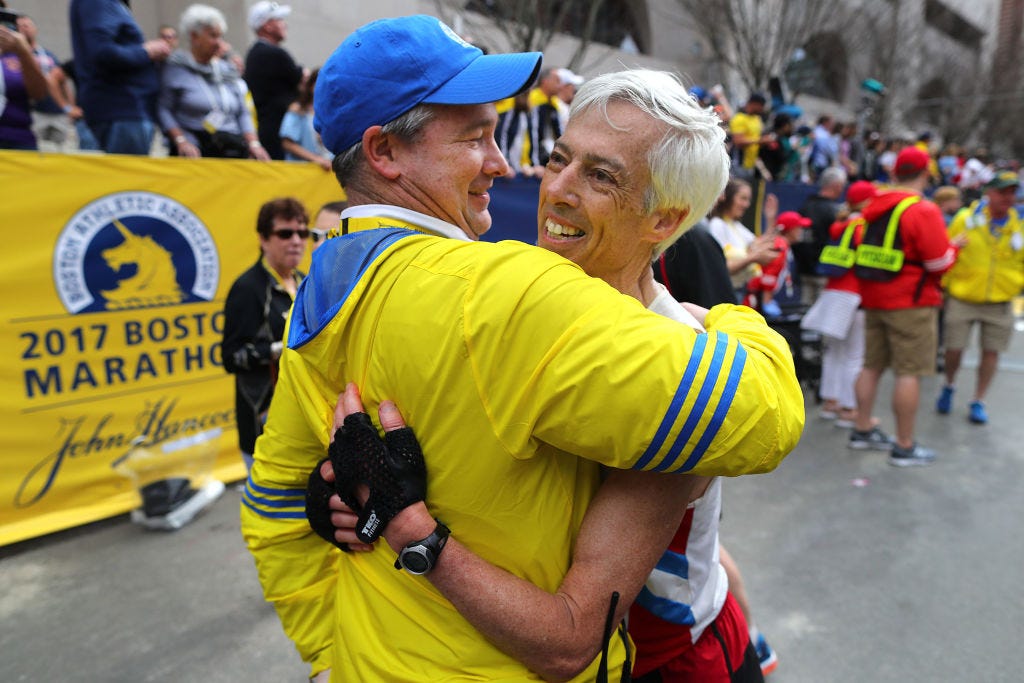Two April Appreciations: Beach, Schell
The person who has run more consecutive Boston Marathons than anyone else. And the group with a dramatic, important Earth Day presentation.

Bennett Beach at the Boston Marathon
Today’s race was different from all others since Lyndon Johnson was president. It was the first since 1968 without an entry from Bennett H. Beach.
Ben Beach is a longtime friend. We were on the college newspaper together, and in those days he set a “healthy” example for our fellow young-but-sleepless-and-addled news staffers by running the Boston Marathon in 1968.
I joined him for the next two, in 1969 and 1970. In that second race, at age 20, I got my best-ever marathon time, 3:02. That was more than half an hour slower than Ben Beach’s best, in the years to come, and was in the range I neared in subsequent marathons in DC and elsewhere. But I never ran in Boston again.
Ben Beach did. He ran every single Boston Marathon, from 1968 to 2021. (Like most other contestants, his race was interrupted by the marathon bombing in 2013.) He holds the record for consecutive finishes there, at 54.
I have written about him in 2011, in 2014, in 2015, and in 2016, when he reached his 49th consecutive marathon finish. John Powers, who was also a friend of ours in the college-newspaper days, has a story about Ben, and his decision to stop after 54 straight Boston finishes (and after a bicycling accident this year), in today’s Boston Globe. Ben apparently holds the record not just for Boston but for consecutive 26-mile races at venues anywhere. He has an incredible 17 Boston finishes with times below 2:40. Congratulations to Ben.
And also to Nicholas Thompson, whom I have known in a variety of roles—through the Washington Monthly, in his time at Legal Affairs and Wired, and recently in his position at The Atlantic—in running a time that Ben Beach would be familiar with but that I never got near. Well done all.
Orville Schell and his colleagues, at the Kennedy Center
I’ve written many times about my friend and mentor Orville Schell. He is one of the deans of China studies; he was the actual dean of the UC Berkeley Journalism School when I co-taught a course there, with Katie Hafner, 20-plus years ago; and last year his extraordinary novel My Old Home was published.
Seriously: If you have any interest in China, or China-and-America, or Tolstoy-scale fiction, I hope you will check out My Old Home. I believe it will last.
In his role at the Asia Society, Orville had been the lead force behind an absorbing and powerful photo, video, and text exhibition at the Kennedy Center called Coal + Ice. It’s about the connection between use of coal, especially though not only in China, and loss of ice in Antarctica, Greenland, and around the world—and the resulting storms, drought, fires, and other disruption.
You already “know” this message. But the exhibit has such exceptional photographic and other multi-media presentation that it brings the message home in an additionally powerful way.
It will be in the new REACH facility at the Kennedy Center, in Washington, through Earth Day, April 22. If you have a chance, please be sure to check it out.





Maybe someone could intervention Joe Manchin a la Clockwork Orange and drag him down to the Schell.
Regarding the Schell photo (which is VERY powerful) one of the less appreciated horrors of the Ukrainian conflict is that, in the efforts to reduce demand for Russian oil & gas, countries like Germany and other parts of Europe are replacing it with huge increases in coal, the dirtiest energy source available. You're also seeing record demand for coal in the developing world, as there's lots of it and it's a ready source of power. But no longer cheap, even though off its all-time highs, reached in early March. I fear there will be many more such photos of the sort highlighted by Orville Schell and his colleagues going forward.